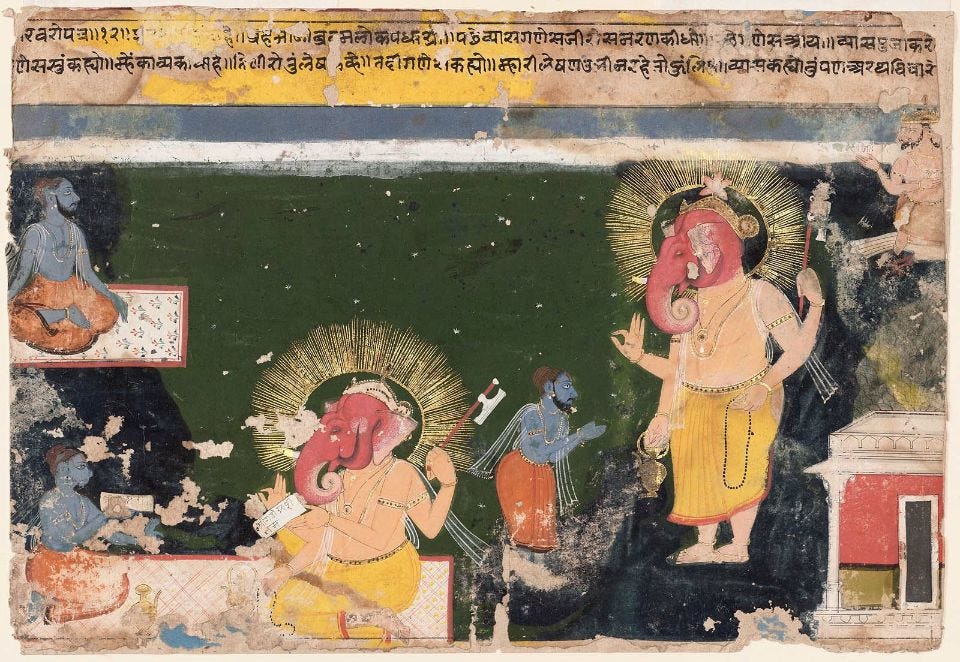Jayary Newsletter #60

Divine Uncertainty
Uncertainty doesn't mix well with divinity. Whether you're a Bayesian or a Frequentist, it's hard to square the all-knowing, all-powerful nature of godliness with the vagaries of chance. Bayesians are subjectivists about chance, i.e., they believe that probability comes from the strength of beliefs we have about an event. Will the coin land heads or tails? A Bayesian believes he's a fifty percent chance of being right when he guesses, so he won't accept a wager different from 1:1 if he thinks the coin is fair.
Would Indra have any doubts about the outcome?
I don't believe so: the rain god knows exactly what's going to happen since he can observe my hand holding the coin and the wind conditions and every other variable and even if that fails because of quantum fluctuations, he will intervene at the last moment and set the world in accordance with his beliefs. To be a god (or God) is to make the world conform to your image.
What about the frequentist?
He believes the coin is fair because it lands heads about half the time as you keep tossing it again and again. Again, Indra doesn't need to observe the procession of heads and tails. His eyes are sharp enough that he can take a mental photo a nanosecond before the coin settles, and that picture will tell him exactly what's happening.
So what does an epic about the intermixture of gods and men do about the outcome of events? Why does it have so many dice games?
Chance and Power
Neither Draupadi nor Damayanti gamble (at least in the open) and yet they suffer the consequences of their husband's gambling addiction; in fact, they suffer more than their husbands. Power means several things, but among its chief uses is the ability to weather uncertainty - with a caveat I will come to later.
Consider climate change. It's mostly been caused by carbon emissions from people in the rich countries of the world with upstarts such as China and India catching up fast. Yet, these rich people, i.e., the populations of the wealthy countries as a whole and the well off amongst the developing world, are the ones most likely to weather the consequences of climate change (pun intended). They have the money to buy air conditioners and houses further inland while the poor of our species and every unfortunate creature of other species fend for themselves.
In other words, when misfortune strikes the elite, they can outsource their liabilities to the remaining 99%. It's the opposite of a just world; enough to make us doubt in a benevolent deity, or worse, start believing in a malevolent deity.
However, there's a caveat; I should have said that the elite survive normal downturns better than the proles, but in doing so, not only do they skim off the fat of the toiling millions, they also accumulate the resentments of the riff-raff.
Power insures short term stability but opens itself to extreme instability in the long run. That's in the nature of pyramids. Remember that the ones at the top have a longer way to fall when the whole structure collapses. That's what happened to the dinosaurs. That's what will happen to us one day.
This is the last theoretical jayary on chance and uncertainty. I will be back to Damayanti's woes starting tomorrow.
Safety First
After pleading with Nala to no effect, Damayanti realises that he's not about to stop gambling. He's been playing as a man possessed - which he is! - for days and neither his citizens nor his ministers or his wife have managed to get through to him.
Which makes me wonder: was there an ancient code for king-replacement? When was it OK to remove a king from his throne? When he's old and senile? When he's clearly incompetent or indisposed? What, if any, was the accepted procedure for removing a king from power, either temporarily or permanently. When was a coup or assassination justified?
Damayanti knows that the situation is going from bad to worse so she calls for Nala's charioteer Varshneya and asks him to take her children to Vidarbha for safety. Who knows what the man will gamble away?
Strangely, Yudhisthira didn't stake his children even though Draupadi had given birth to children with all five Pandavas by then. Abhimanyu would have been about three years old at the time of the sabha. Why didn't Yudhisthira hand over the children along with his brothers and wife? It's possible he would have done so, but the first round of gambling stopped with Draupadi's molestation. Or is the staking of children is unthinkable? We don't know. The next generation of the Kuru dynasty play almost no role in the story - Abhimanyu is the only one who makes a substantial appearance.
Damayanti asks Varshneya to take her children on Nala's semi-divine chariot and horses and then she offers him free agency: he could enter into employment in Vidharbha or go wherever he chooses. Varshneya chooses free agency and takes employment with the Raja of Ayodhya. The description of Varshneya employment opportunities isn't particularly interesting on its own, but it's one of the few places where the Jaya describes the life of someone outside the elite.


